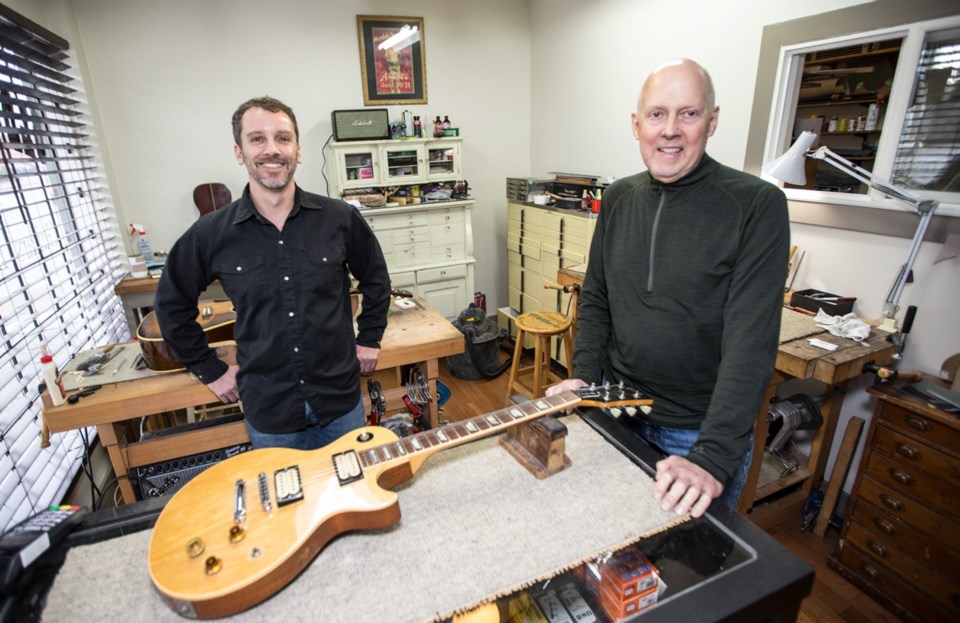Dylan Rovere doesn’t have a lot of room for new furniture or fixtures in his new workspace, but the guitar maker and craftsman might consider clearing some space for a new phone.
Rovere, who has just taken ownership of all 400 square feet of Old Town Strings on Hillside Avenue, could need some of that space for a direct line to former Old Town owner David Cahill, who has left the guitar repair shop after 47 years.
“I can’t hope to fill Dave’s shoes in some areas,” said Rovere. “When it comes to banjos and vintage guitars, there are very few people who have the encyclopedic knowledge that Dave does.”
The 71-year-old Cahill, who joked that he’d consider establishing a “nine-one-Dave” phone line just for Rovere, has decided to retire to spend more time in the outdoors as well as playing the guitar and banjo, and less time fiddling with other people’s frets and strings.
“I haven’t really settled into being retired yet, but I’m an outdoor guy who likes to hike a lot, hunt and fish. I’m not doing craft work right now and I’m not going to do any sort of part-time instrument work because I do have those other interests,” he said. “But I play guitar and banjo, so I’ll have a little more time to do that. I’ve been missing that for sure.”
When asked why he decided to retire and sell the store, Cahill said it was just the right time. The transplanted Virginian has been at the Hillside location since 2008, when he closed his Market Square location.
“It’s the combination of my age and I’ve been running this for 47 years and I felt like I’d done enough and my health has not been wonderful,” he said.
Cahill knows he will miss being in the store each day, dealing with customers, working on the instruments and collaborating with skilled craftspeople who have helped him establish a solid reputation for quality work for nearly half a century.
“To be honest, when I first started thinking about selling the shop I was concerned about [ensuring continuity of service]. It was completely unpredictable what might happen,” he said. “But I’m thrilled Dylan has bought it, he knows what’s going on, he’s good and I have no doubt things will flow along nicely.
“Plus, he adds to what I was doing.”
Where Cahill was focused on repair, Rovere, a luthier who has been handmaking guitars for 14 years, brings an artisan’s eye to that kind of work.
The pair have known each other for nearly 25 years.
Rovere, 46, used to sell his handmade guitars, some taking as many as 200 hours to bring to life, through Cahill’s downtown retail shop. When Rovere diversified his business by starting repair work, they often referred work to one another.
“I was a guitar maker, then I started to do some repair work and that business started building — there was a market switch that demanded it,” said Rovere, whose workshop is a few blocks from Old Town’s Hillside location.
“Recently, I was trying to build and repair from out of the same space and that was difficult. It’s two different worlds and I was finding it awkward. I’m hoping by moving all the repair here it will open that shop up,” he said.
While repair is a very different kind of work to crafting an instrument from raw wood, Rovere maintains there are useful similarities.
“[Repair] is still pretty creative, no two jobs are exactly the same. I still get that creative kick from [repairing] and handling guitars and seeing stuff. That feeds the muse for building,” he said.
He’s the first to admit there are challenges ahead, not the least of which is living up to a legacy and reputation Cahill has established as a go-to for musicians. “This shop draws from the whole south Island, it’s a big market,” Rovere said.
He also has to manage a transition from artisan to businessman. “That’s the tougher one. This is a more complicated business so there’s more business stuff to do. Artists are notoriously bad businesspeople and when it comes to staying on top of that kind of thing, I’m having to learn and adapt pretty quickly,” he said. “But it’s a neat challenge and I feel a little reinvigorated by it. It’s good to kick yourself out of the comfort zone.”



